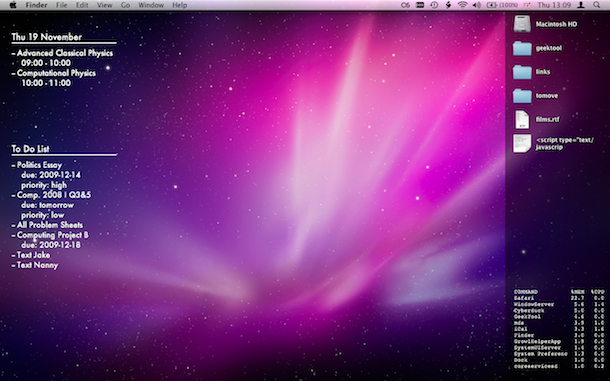

Two of these examples state their values explicitly. The value doesn’t need to be expressed explicitly because the tool doesn’t let you do otherwise. In this sense the tool is robust against non-reproducible experiments. I want to write about RemoteExperiments in more detail, but the connection to values is that if I use it to run my experiments I get reproducibility entirely for free.
#GEEKTOOL TEMPLATES CODE#
Each experiment corresponds one-to-one to a commit that lives in a git repository, so if I ever want to reference the code and settings used in a past experiment I can.


To manage these I’ve made a tool called RemoteExperiments that uses a combination of git, ssh, and rsync to let me configure experiments on my laptop and then set them running (possibly in large numbers) on the cluster. I frequently run numerical simulations on a compute cluster. With plans and reviews the values are less explicit than my other examples, but they’re still clearly encoded in the questions and templates. The value is “Consistency, every day, every week.”, and I find that comes through from this process. These are things like exercise that I want to do each day or each week, regardless of what else is happening. In addition to getting at these questions, my reviews ask about my habits and how frequently I completed them. The value here is “I want to do what I plan to do.”, followed by a secondary value of “If I don’t manage it, I want to know why.” These questions force me to write down what I want to achieve each week, and because I know there’s a review coming later I have an incentive to make those plans accurate. This is meant to give me something to compare against when I write a review the following week. What might get in the way of my doing this?.What tasks do I want to complete this week?.Weekly Plans & ReviewsĪt the start of each week I write a weekly plan based on a template that gets me to ask: I don’t have proof that they’re helpful, but my subjective sense is that they are. These just sit on my background and I notice them from time to time. That text file is called values.md, and includes values like “Be Reproducible” (meaning, be sure that my science is reproducible) and “Do, Do, then Automate” (a reminder that many tasks benefit from automation, but not one-off’s). I use GeekTool to display the contents of a text file on top of my desktop background. With this environment I’ve had more success at coming up with ideas that are genuinely different. Only after I’m done generating ideas do I try to sift through and see which ones seem useful/promising.īefore I created this environment I found that I would usually write down ideas that were straightforward (and low-risk) extensions of things I’d done before. They remind me that the whole reason I’m sitting down to brainstorm is to come up with new ideas further afield than I normally would. I’m still tweaking these values, but so far I’m fairly happy with them. Cmd+E Will bring up an (incomplete) list of possible approaches. Maintain an attitude of suspended judgement. It does this by copying and opening a template text document that says the following: # Session: I have a shell script that sets up a work environment for brainstorming. Here are some examples of tools I’ve made with an eye to values. I previously argued that tools should express values.
#GEEKTOOL TEMPLATES SOFTWARE#


 0 kommentar(er)
0 kommentar(er)
